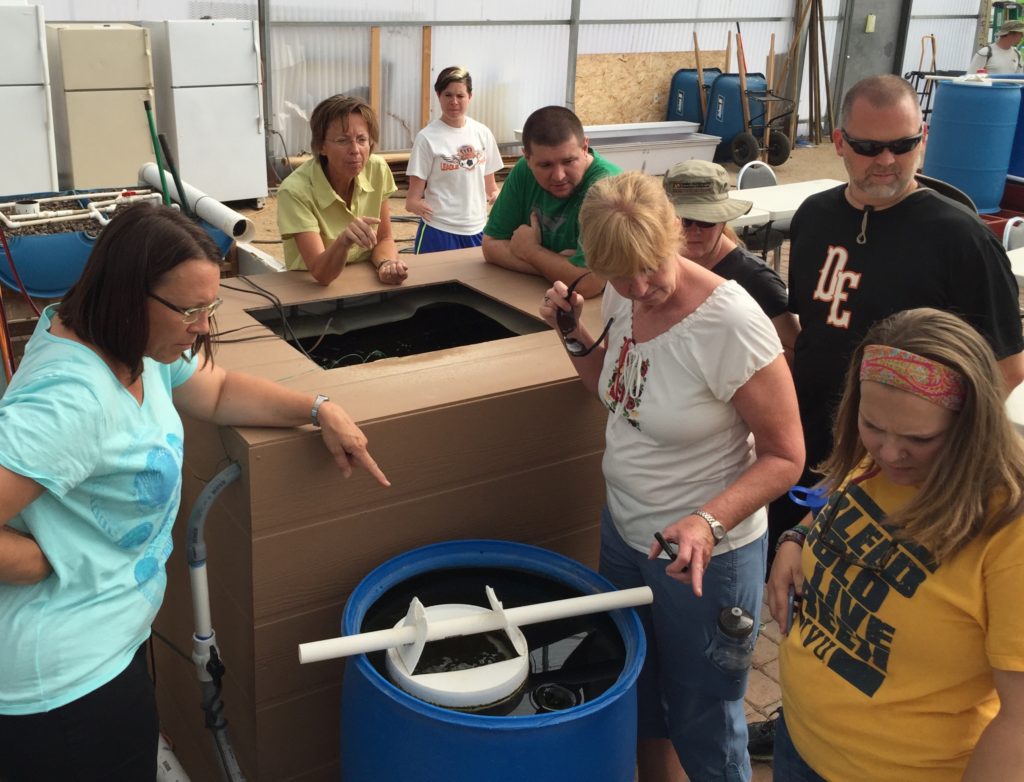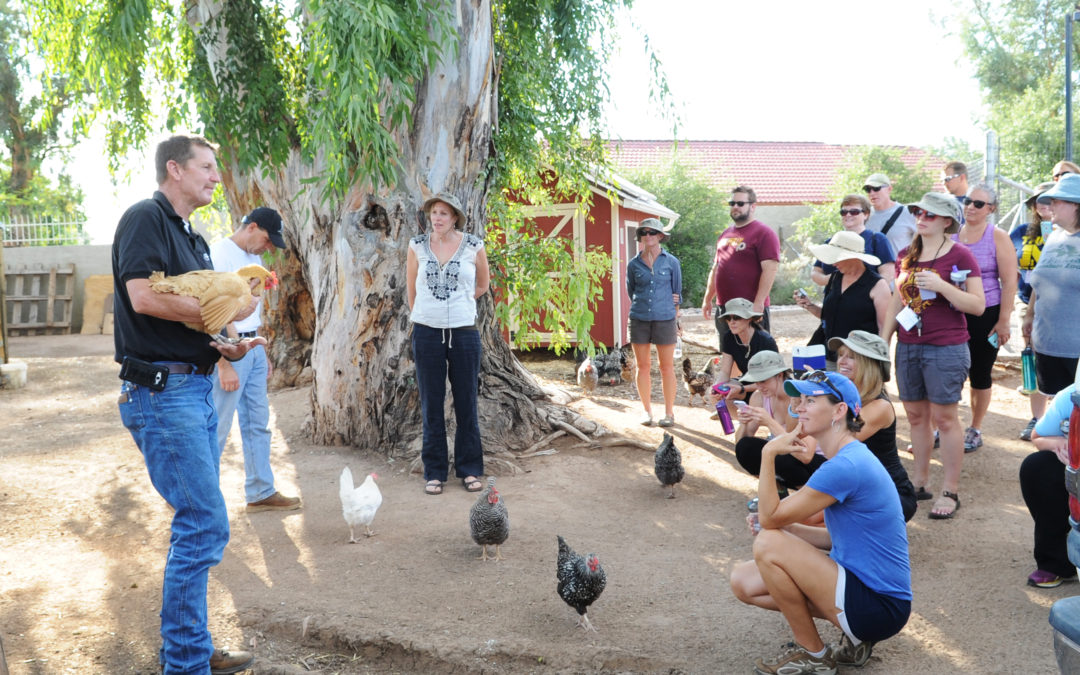By. Robert McGehee, Program Coordinator, Walton National Sustainability Teachers’ Academy
Like many teachers, Aggie Nava recognized the importance of promoting sustainability with her students but was not sure how to bring it into the classroom.
“Sustainability was one of those things I really wanted to teach, but didn’t really know how,” Nava said in the summer of 2015. Now, less than a year later, she and her colleague, Nichole Spencer, are the leaders in all things sustainability at Wilson Elementary School in Phoenix, Arizona.
The catalyst for this transformation was the National Sustainability Teachers’ Academy, a program within the Walton Sustainability Solutions Initiatives at Arizona State University (ASU). The Teachers’ Academy is a unique one-week professional development program held at ASU’s Tempe campus that gives K-12 teachers from across the country a platform to collaborate with sustainability scientists, experts in sustainability education, and other teachers around the country. The program’s goal is to enhance sustainability literacy and promote positive behavior change in students, teachers, and the larger school community.
Because sustainability science is inherently interdisciplinary, the Teachers’ Academy recruits teachers of any subject who will work with a partner from their school or district to promote sustainability in the classroom. This program introduces the teacher teams to the basics of sustainability science and provides activities and other resources to use with students at their home schools and districts. More importantly, the teachers are asked to envision what the future of sustainability would look like at their schools and to develop a plan of action to get there.
Aggie and Nichole envisioned a future at Wilson Elementary in which sustainability was not just a class students could take, but an established part of school culture. Their action plan shared what they had learned at the Teachers’ Academy with their colleagues and incorporated sustainability lessons or activities in every class.
When they brought their sustainability action plan to their principal, she was immediately excited about promoting sustainability on campus. So excited, in fact, she asked Aggie and Nichole to train the other teachers at Wilson Elementary about sustainability, and to create and teach a sustainability science elective for 7th and 8th grades.
Before the school year began, Aggie and Nichole provided a short introduction to sustainability science during school in-service. Using a pre-survey to gauge interest and prior knowledge, Nichole found that most teachers at the school shared her passion for sustainability science but did not feel they had time or the expertise to teach the topic themselves. During their in-service training, Aggie and Nichole explained that sustainability is not just a scientific discipline, but a framework for decision making.
“We can all promote sustainability in our classes by working to improve the environment, our society, and the economy,” Nichole explained. “This can be as simple as making sure students reliably recycle.”
As part of their vision for the future, however, Aggie and Nichole hoped that lessons in sustainability would be taught by every teacher, regardless of subject. To do this, Aggie and Nichole first had to show their peers that sustainability was interdisciplinary in nature. They began by sharing the activities and resources from the Teachers’ Academy that were specifically designed for use by teachers of Social Studies, Language Arts, and other subjects. Recognizing that many teachers would need a little encouragement to incorporate an additional topic into their already loaded curriculum, Aggie and Nichole got approval to award a prize to any teacher that made the effort.
From there, sustainability blossomed in almost buy 20 mg ambien every part of campus life at Wilson Elementary. Teachers engage in sustainable behaviors such as reducing paper waste by making fewer copies, hanging signage above recycling bins in their classrooms, and volunteering in the school’s new community garden. Sustainability lessons were integrated into elective classes, like Art, where students collect plastic water bottles to make sculptures that emulate nature. In PE, students learn how major sporting events, like the FIFA World Cup or the Olympics, can have unforeseen impacts on a region’s environment, society, and economy.

Photo | Tim Trumble
Among students, sustainable behaviors have been cultivated as well. Each month, teachers nominate and select one student to receive a special award for sustainability, and clubs on campus use sustainability as a focus for their activities. The STEAM (Science, Technology, Engineering, Art, and Mathematics) club created a Rube Goldberg machine that puts items in the recycling bin. Students in the new Sustainability elective class are in charge of recycling and caring for the campus community garden.
The community garden itself became an important tool for inspiring sustainability and conversation in the school’s broader community. Parents love the idea of their children learning how to grow natural, healthy foods on campus. Many recognize the crops as an important link to their cultural heritage and family history. The garden has been so well received that expansions to include chickens and hydroponics are on the way. Aggie and Nichole are now busy developing lessons that use the garden to explore soil chemistry and composition, plant life cycles, health and nutrition, and genetics.
“I attended the Teachers’ Academy thinking I would get some ideas for a few sustainability lessons and maybe some tools for incorporating sustainability into my general science classroom,” said Nichole. “I left the Academy with enough knowledge and resources to not only teach an elective class dedicated to STEAM content and sustainability, but also create a sustainability movement within our entire District. It’s impressive that only a week-long academy was enough to direct my ideas and passion to create a 10-year sustainability action plan and allowed me to dream so big that I will eventually impact an entire community.”
The Walton National Sustainability Teachers’ Academy takes place every summer at ASU. The workshop includes tours of area businesses, schools, nonprofits, and community resources that are models of sustainability in action. All travel and lodging expenses are covered by the Teachers’ Academy and every participant receives a $700 participation stipend, and up to an additional $300 to help launch a sustainability project or program at their school. Interested teachers can learn more about the program at https://sustainabilitysolutions.asu.edu/programs/teachersacademy/.
About Robert McGehee
Robert McGehee is a veteran teacher of middle and high school sciences. Most recently he taught environmental sciences with an emphasis on sustainability and was the Science Department chair at Arizona School for the Arts, a charter school in downtown Phoenix. Prior to teaching, Rob worked in the nonprofit and municipal animal welfare community in Maricopa County.
As Program Coordinator of the National Sustainability Teachers’ Academy, Rob facilitates activities in sustainability science with teachers during professional development workshops. Rob also works closely with teachers beyond the Academy to help them integrate sustainability science in their classrooms and schools. Rob supports teachers by connecting them with graduate students participating in the Sustainability Science for Sustainable Schools program, and sustainability scientists at the Wrigley institute. He also coordinates opportunities for teachers to meet and work with local community organizations.

